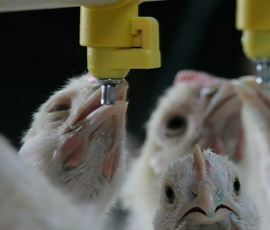British Poultry Council drive to cut antibiotics

British Poultry Council members have agreed to reduce the amount of antibiotics used in poultry production in a bid to help tackle resistant strains of disease.
The decision follows recommendations made by the European Food Safety Authority last July to address rising levels of antibiotic resistance in livestock and humans, and the publication of a new 12-point Action Plan by the EU Commission in November.
“New scientific evidence on the threat of antimicrobial resistance is being heeded by the poultry industry,” said BPC chairman John Reed. “We recognise the strength of the recent EFSA recommendations, and as responsible stewards of veterinary medicine we want to meet that challenge.”
BPC members have committed to stop using all cephalosporins in the poultrymeat production chain from 1 January, 2012, as well prophylactic use of all quinolones for day-old chicks. Both tend to be used in parent flocks – cephalosporins are the only antibiotics which can be given alongside the Marek’s vaccine, while quinolones are prescribed for chicks when parent flocks face a disease challenge which can’t be treated by other antibiotics.
“Cephalosporins have not been used at broiler level in the UK for five or six years,” said BPC veterinary adviser Daniel Parker. “But the implication will be that parent flocks may have to deal with slightly higher mortality. Ultimately, it’s a question of ensuring that antibiotics are used responsibly – the aim is to get more targeted use without compromising health and welfare.”
The BPC has also agreed to review the use of all antimicrobials during production, and to work with government to survey the prevalence of antibiotic resistant ESBL/Amp-C bacteria strains in UK poultry. “We want a balanced approach across humans and livestock,” said Peter Bradnock, chief executive at the BPC. “We are not saying to stop using all antibiotics; we are withdrawing them where we can and where other approaches can be taken.”
Improved biosecurity and hygiene could go some way to reducing the need for antibiotic use, said Anthony Taylor, technical services manager at Cobb Europe. “We withdrew prophylactic antibiotic use in parent flocks in April 2010. It was difficult initially, and there has been a slight increase in mortality. But we’ve worked very hard to live without these products and it shows it can be done.”
* To secure your next issue of Poultry World, why not subscribe on-line. And if you have a view on anything affecting the sector, share it with us in our Poultry Platform forum area.
